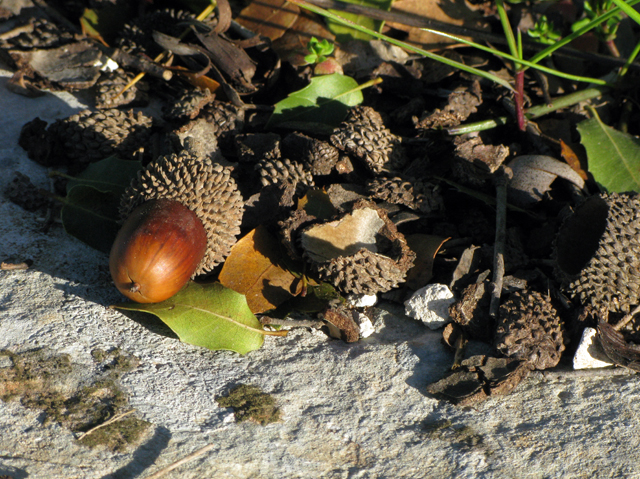 Image by Cindy47452 on Flickr
Image by Cindy47452 on Flickr
It’s 6am. Even the local cockerel isn’t awake yet. The town is cloaked in mist and the car windscreen is covered in a heavy layer of dew. Alex and I climb in, bleary-eyed and shivering. The windscreen wipers shriek when I turn them on, making us both jump and then giggle with tired hysteria. I put the car into gear and start the short drive to school. As we approach, the mist begins to glow red. “Look – a spaceship,” comments Alex. Even at this time in the morning he’s quipping, damn him. Of course, it’s no spaceship, just The Bossmobile – an enormous 4×4 Volvo, in which he is about to drive us to Vieste. The journey will take about 4 hours, even with The Boss’ super-fast driving skillz, so we climb in and settle down, hoping to get some more sleep before we have to start work. Today is an exam day and we, as Cambridge Oral Examiners, have the dubious honour of haring around the region to speak to students and seal their fate. As regards passing or failing their exam, anyway.
In the event, sleep is elusive. The Boss favours his music L.O.U.D. My knee vibrates where it rests about an inch from the speakers, and my poor, shrunken, sleepy brain rattles in my skull. Ah well. At least the views are pretty outside the window. The palicelle, whose spiky, succulent leaves are dusty grey-green in the height of the day, are given unexpected life by the early-morning dew, and are bright and glossy – at least until the sun gets to them. Mist sits in pockets in the fields, just beginning to be burnt off by the first fingers of sunlight. It’s elusive stuff: caught from the corner of the eye, it wraps the olive trees in a heavy grey-white blanket. Look straight at it, however, and it disappears like – well, like *mist*, funnily enough, wreathing its way up and out through the branches. Wrecked cars on the top deck of a transporter float above the low-lying grey vapour. They paint an incongruous picture of modernity, contrasting with the peace and traditionalism of the olive groves next to them. A pair of birds wheel in midair – maybe fighting, but, equally, maybe flirting? They rush together as if to attack, but then circle around each other, wing-tip to wing-tip, in an intricate, lightning-quick dance, before dashing apart and starting the sequence all over again.
As we reach Lecce, the sun is beginning to poke its way through the clouds of mist. Soft early-morning light falls on buttery Salentino stone, giving it life and turning it a warm, rose-tinged yellow. Stone from this area is highly rated, being soft and easy to carve. Looking at the tones of its colour this morning I see another clear reason why people want to use it. The castle is breathtakingly beautiful and, right at this moment, looks far more inviting than repelling. Just as well there aren’t any invading hordes on the way.
We pass through olive grove after olive grove, as the Bossmobile munches up the miles. You’d think it would get monotonous, but, in fact, they’re all very different. Some trees are squat and low, with multiple base trunks where they’ve been grafted and regrafted. They reach no more than about 10 foot high, with low, densely-fruited branches. Others, in contrast, wave spindly, twisted fingers 20 foot into the air, reaching for the sun. I’m not sure whether it’s different varieties of olive or just different farming methods, but it all adds to the richness and variety of the view. The groves drop away for a moment, as a quarry bites into the landscape, and reappear again as quickly as they went. Stone and olive oil. Not two things that you’d immediately think of in the same sentence, but, when it comes to industry, here they go hand in hand.
Insistent disco pounds out of the car speakers, syncopated with the bumping of the tyres as the Bossmobile roars over the terrible road surface. As we rattle further north, 70s disco gives way to 80s electro. If we went as far as Rome we might even get up to the present day – who knows? On the other side of the motorway there is a filling station with a giant, fibreglass Jesus on the forecourt, hands raised to the sky. There’s a carved stone version on the road from my town to Lecce (known by Alex, due to mispronunciation of the word Gesu by teachers past, as the big Gazoo), which I’d always been quite impressed by. This one, however, is three times the size, with his cuffs painted gaudy blue and his beard and hair brown. It looks like an animatronic robot. Pure anti-aesthetic genius. A little further on there’s a deserted petrol station which looks as if it were built purely for Apes and Pandas. (For non-Italian readers, those are both vehicles – southern Italy may be wild, but we haven’t been overrun by diesel-guzzling wild animals. Yet.) The roof is far too low for any lorries to be able to get in, and the forecourt is only about the size of my front room. The paint on the sign is blistered and peeling; like a child’s toy left out and forgotten for the summer, it’s oddly poignant.
It’s about 8.30 and the sun is now well and truly up. The Bossmobile roars into a filling station. “Caffè, ragazzi?” Alex and I crawl out of the back seat and cross the forecourt. It’s a pleasant surprise to find that we’re right next to the sea. I’ve clearly been looking out of the wrong window for the past half hour. I’d been so distracted by the fact that there were hills that I completely forgot to look anywhere else. Hills! Salento is as flat as the proverbial pancake, but now that we’ve got into Puglia, the land has started to rise up again. It’s not like we’re in the Alps or anything, but there’s definite undulation. Fabulous. It gets even more exciting as we get closer to Vieste. For the last 40 or 50km we are driving along mountain roads, winding their narrow way ever further upwards. Usually this would make me feel a bit carsick, but by this time I’m so desperate for a pee that I can’t think of anything else but the excruciating pain in my bladder. Beautiful sea views be damned: how long before I can become acquainted with the nearest bathroom? We reach the top of the mountain and The Boss starts to ignore the SatNav. I assume this means that he knows where he’s going, but apparently not. We double back on ourselves three times before he stops to ask for directions. Meanwhile, I’m dangerously close to wetting myself and, from the pained look on Alex’s face, he’s in pretty much the same situation. Aargh! Luckily, just before there is a disaster, we pull into the school grounds. Alex and I race past the crowds of nervous-looking students and into the nearest loos. Crisis averted. Now, about these exams …

















